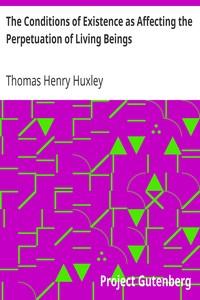Read this ebook for free! No credit card needed, absolutely nothing to pay.
Words: 11455 in 3 pages
This is an ebook sharing website. You can read the uploaded ebooks for free here. No credit cards needed, nothing to pay. If you want to own a digital copy of the ebook, or want to read offline with your favorite ebook-reader, then you can choose to buy and download the ebook.


: The Method by Which the Causes of the Present and Past Conditions of Organic Nature Are to Be Discovered; the Origination of Living Beings Lecture III. (of VI.) Lectures to Working Men at the Museum of Practical Geology 1863 on Darwin's Work: Origin of Sp
THE METHOD BY WHICH THE CAUSES OF THE PRESENT AND PAST CONDITIONS OF ORGANIC NATURE ARE TO BE DISCOVERED.--THE ORIGINATION OF LIVING BEINGS
In the two preceding lectures I have endeavoured to indicate to you the extent of the subject-matter of the inquiry upon which we are engaged; and now, having thus acquired some conception of the Past and Present phenomena of Organic Nature, I must now turn to that which constitutes the great problem which we have set before ourselves;--I mean, the question of what knowledge we have of the causes of these phenomena of organic nature, and how such knowledge is obtainable.
Here, on the threshold of the inquiry, an objection meets us. There are in the world a number of extremely worthy, well-meaning persons, whose judgments and opinions are entitled to the utmost respect on account of their sincerity, who are of opinion that Vital Phenomena, and especially all questions relating to the origin of vital phenomena, are questions quite apart from the ordinary run of inquiry, and are, by their very nature, placed out of our reach. They say that all these phenomena originated miraculously, or in some way totally different from the ordinary course of nature, and that therefore they conceive it to be futile, not to say presumptuous, to attempt to inquire into them.
To such sincere and earnest persons, I would only say, that a question of this kind is not to be shelved upon theoretical or speculative grounds. You may remember the story of the Sophist who demonstrated to Diogenes in the most complete and satisfactory manner that he could not walk; that, in fact, all motion was an impossibility; and that Diogenes refuted him by simply getting up and walking round his tub. So, in the same way, the man of science replies to objections of this kind, by simply getting up and walking onward, and showing what science has done and is doing--by pointing to that immense mass of facts which have been ascertained and systematized under the forms of the great doctrines of Morphology, of Development, of Distribution, and the like. He sees an enormous mass of facts and laws relating to organic beings, which stand on the same good sound foundation as every other natural law; and therefore, with this mass of facts and laws before us, therefore, seeing that, as far as organic matters have hitherto been accessible and studied, they have shown themselves capable of yielding to scientific investigation, we may accept this as proof that order and law reign there as well as in the rest of nature; and the man of science says nothing to objectors of this sort, but supposes that we can and shall walk to a knowledge of the origin of organic nature, in the same way that we have walked to a knowledge of the laws and principles of the inorganic world.
But there are objectors who say the same from ignorance and ill-will. To such I would reply that the objection comes ill from them, and that the real presumption, I may almost say the real blasphemy, in this matter, is in the attempt to limit that inquiry into the causes of phenomena which is the source of all human blessings, and from which has sprung all human prosperity and progress; for, after all, we can accomplish comparatively little; the limited range of our own faculties bounds us on every side,--the field of our powers of observation is small enough, and he who endeavours to narrow the sphere of our inquiries is only pursuing a course that is likely to produce the greatest harm to his fellow-men.
But now, assuming, as we all do, I hope, that these phenomena are properly accessible to inquiry, and setting out upon our search into the causes of the phenomena of organic nature, or, at any rate, setting out to discover how much we at present know upon these abstruse matters, the question arises as to what is to be our course of proceeding, and what method we must lay down for our guidance. I reply to that question, that our method must be exactly the same as that which is pursued in any other scientific inquiry, the method of scientific investigation being the same for all orders of facts and phenomena whatsoever.
I must dwell a little on this point, for I wish you to leave this room with a very clear conviction that scientific investigation is not, as many people seem to suppose, some kind of modern black art. I say that you might easily gather this impression from the manner in which many persons speak of scientific inquiry, or talk about inductive and deductive philosophy, or the principles of the "Baconian philosophy." I do protest that, of the vast number of cants in this world, there are none, to my mind, so contemptible as the pseudoscientific cant which is talked about the "Baconian philosophy."
To hear people talk about the great Chancellor--and a very great man he certainly was,--you would think that it was he who had invented science, and that there was no such thing as sound reasoning before the time of Queen Elizabeth. Of course you say, that cannot possibly be true; you perceive, on a moment's reflection, that such an idea is absurdly wrong, and yet, so firmly rooted is this sort of impression,--I cannot call it an idea, or conception,--the thing is too absurd to be entertained,--but so completely does it exist at the bottom of most men's minds, that this has been a matter of observation with me for many years past. There are many men who, though knowing absolutely nothing of the subject with which they may be dealing, wish, nevertheless, to damage the author of some view with which they think fit to disagree. What they do, then, is not to go and learn something about the subject, which one would naturally think the best way of fairly dealing with it; but they abuse the originator of the view they question, in a general manner, and wind up by saying that, "After all, you know, the principles and method of this author are totally opposed to the canons of the Baconian philosophy." Then everybody applauds, as a matter of course, and agrees that it must be so. But if you were to stop them all in the middle of their applause, you would probably find that neither the speaker nor his applauders could tell you how or in what way it was so; neither the one nor the other having the slightest idea of what they mean when they speak of the "Baconian philosophy."
You will understand, I hope, that I have not the slightest desire to join in the outcry against either the morals, the intellect, or the great genius of Lord Chancellor Bacon. He was undoubtedly a very great man, let people say what they will of him; but notwithstanding all that he did for philosophy, it would be entirely wrong to suppose that the methods of modern scientific inquiry originated with him, or with his age; they originated with the first man, whoever he was; and indeed existed long before him, for many of the essential processes of reasoning are exerted by the higher order of brutes as completely and effectively as by ourselves. We see in many of the brute creation the exercise of one, at least, of the same powers of reasoning as that which we ourselves employ.
The method of scientific investigation is nothing but the expression of the necessary mode of working of the human mind. It is simply the mode at which all phenomena are reasoned about, rendered precise and exact. There is no more difference, but there is just the same kind of difference, between the mental operations of a man of science and those of an ordinary person, as there is between the operations and methods of a baker or of a butcher weighing out his goods in common scales, and the operations of a chemist in performing a difficult and complex analysis by means of his balance and finely-graduated weights. It is not that the action of the scales in the one case, and the balance in the other, differ in the principles of their construction or manner of working; but the beam of one is set on an infinitely finer axis than the other, and of course turns by the addition of a much smaller weight.
You will understand this better, perhaps, if I give you some familiar example. You have all heard it repeated, I dare say, that men of science work by means of Induction and Deduction, and that by the help of these operations, they, in a sort of sense, wring from Nature certain other things, which are called Natural Laws, and Causes, and that out of these, by some cunning skill of their own, they build up Hypotheses and Theories. And it is imagined by many, that the operations of the common mind can be by no means compared with these processes, and that they have to be acquired by a sort of special apprenticeship to the craft. To hear all these large words, you would think that the mind of a man of science must be constituted differently from that of his fellow men; but if you will not be frightened by terms, you will discover that you are quite wrong, and that all these terrible apparatus are being used by yourselves every day and every hour of your lives.
There is a well-known incident in one of Moliere's plays, where the author makes the hero express unbounded delight on being told that he had been talking prose during the whole of his life. In the same way, I trust, that you will take comfort, and be delighted with yourselves, on the discovery that you have been acting on the principles of inductive and deductive philosophy during the same period. Probably there is not one here who has not in the course of the day had occasion to set in motion a complex train of reasoning, of the very same kind, though differing of course in degree, as that which a scientific man goes through in tracing the causes of natural phenomena.
Free books android app tbrJar TBR JAR Read Free books online gutenberg
More posts by @FreeBooks


: Strife: A Drama in Three Acts by Galsworthy John - Strikes and lockouts Drama; Social conflict Drama; English drama; Political plays; Tinplate industry Drama; Labor movement Drama


: The Perpetuation of Living Beings Hereditary Transmission and Variation Lecture IV. (of VI.) Lectures to Working Men at the Museum of Practical Geology 1863 on Darwin's Work: Origin of Species by Huxley Thomas Henry - Evolution (Biology); Darwin Charles 1





